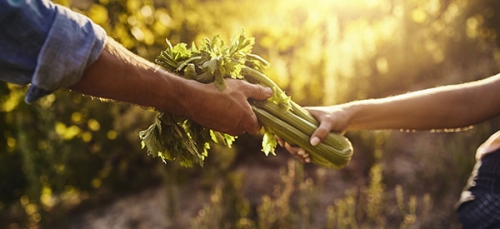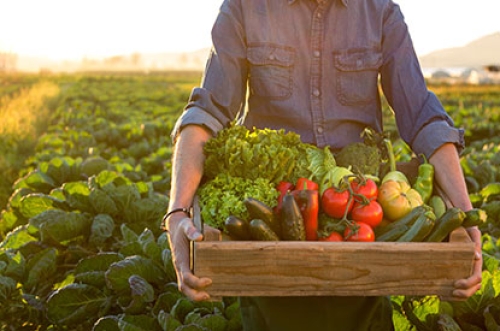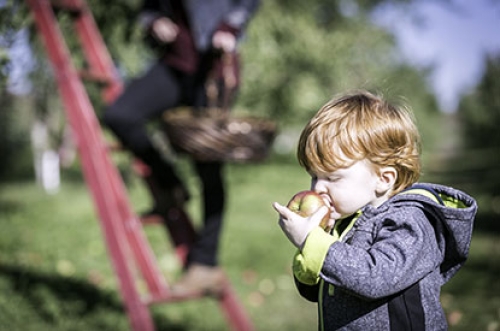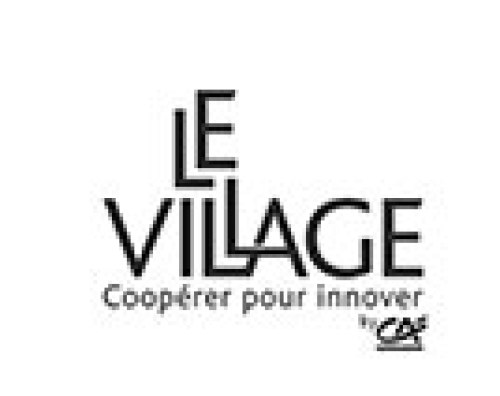- #Agri Food
- 2019/10/31
- 0
-
26
Short distribution channels: an evolution in consumer behaviour and our society

Short distribution channels are proving increasingly successful. They are popular because they respond to the new economic, social and environmental expectations of consumers and producers alike. They provide consumers with high-quality local produce subject to the same health and safety requirements as those of other distribution methods. They are also an excellent way of strengthening relations between farmers and consumers, and between town and country. As a contributor to major social transformations, Crédit Agricole supports short-distribution producers and agritourism.
What are short distribution channels?
According to the French Ministry of Agriculture and Food, a short distribution channel is “a method of selling agricultural products either through direct sales by the producer to the consumer or through indirect sales involving no more than one intermediary between the farmer and the consumer”.
An increasingly diverse distribution system
As part of an individual or collective approach, and through direct or indirect sales, numerous distribution systems exist today, each one of them adapting to new consumer trends and harnessing innovations.
Collective direct sales
Several farmers take turns selling their products at collective points of sale.
Organised sales, in the form of "produce baskets”, consist in the advance purchase of weekly baskets of produce adapted to the season and farm production. In France, this sales approach is known in particular through the Association Pour le Maintien de l’Agriculture Paysanne (AMAP, association for the preservation of local agriculture).
With “drive-in farms”, customers can order products on line and pick them up directly on site.
Individual direct sales
On-farm sales are made directly at the producer’s holding.
This sales channel also concerns organisations (outplacement agencies) and institutions (agricultural schools).
In addition, producers sell their wares directly at local markets, fairs and shows.
Mail-order and web sales are on the rise, for customers wishing to take delivery of their purchases at home. This sales channel forges closer relations primarily between producers and urban consumers.
In door-to-door sales, which are less common, producers travel to their customers’ homes.
Individual indirect sales
Retail stores, catering businesses and medium and large supermarkets are moving into this market by selling “direct from the farm” produce, clearly identified as such. For example, Leclerc, a French supermarket, has launched the “Marché Bio” (organic market) concept with brands and small-scale local producers.
The producers sometimes process their produce themselves, but also call on cooperatives, an important cog in the sector wheel, which process and market the goods.
Meanwhile, new, fast-growing platforms have adopted a local approach in which goods are consumed close to the site of production (the “locavore” movement). Unlike drive-in farms, consumers are delivered at home. The leading company in this sector in France is “La Ruche qui dit Oui !”, which is also expanding in Europe.
Agritourism and wine tourism
With these forms of tourism, visitors can taste products at “farm inns”, guest houses, holiday cottages and wine estates. Farms can also be affiliated with national networks such as (in France) “Bienvenue à la Ferme” and “Accueil Paysan”, which offer guarantees on product origin and quality.
The “Vignobles & Découvertes” label attributed by Atout France serves to list wine tourism destinations offering a broad range of complementary services (including wine-cellar visits and tasting sessions, accommodation, catering, museums and special events). The venues help customers to organise their visits and inform and advise them on qualified services.
A few figures on wine tourism:
- 10,000 wine cellars have a wine tourism activity
- 10 million visitors a year
- Wine purchases: an average €100 to €110 per visit
- Global expenditure relating to wine tourism: €5.2 billion
Figures: Atout France 2016
The new expectations of producers and consumers
Which consumers are in favour of short distribution channels?
Consumers continue to make most of their food purchases in supermarkets, but more and more of them are using local distribution channels. One reason for this is that they want to pay producers a fair price for their produce. Consumers buy local produce for its quality and to enjoy healthy, traceable and less-processed food that meets their nutritional needs. They are also seeking to re-establish contact with the earth and the terroir and to support the local economy. From an environmental standpoint, they consider that consuming locally helps to reduce goods transport and, consequently, CO2 emissions. They also consider that short distribution channels reduce food waste.
What are the expectations of producers selling via short distribution channels?
Farmers, livestock farmers and winegrowers are also attracted to these more direct and profitable distribution systems. One in five producers in France sells via short distribution channels (source: Agreste, 2012). These distribution systems help to reduce their dependency on the agri-food and retail industries and to obtain satisfactory margins. They also stand as an opportunity for forming closer bonds with consumers and raising awareness of their know-how. Lastly, producers have the same environmental concerns as consumers.
Crédit Agricole supports short distribution channels
Le Crédit Agricole est la première banque des agriculteurs et partenaire de toutes les agricultures : il finance et accompagne huit agriculteurs sur dix en France, de l’installation à la transmission, pour la gestion, le développement et la sécurisation de leur activité, et leur propose une gamme complète d’offres et de services sur-mesure.
It supports major transformations in society and is notably contributing to the development of food sales through short distribution channels.
To support farmers in these channels, it renewed its partnership with the Bienvenue à la Ferme network in 2019. A concrete illustration of this commitment is the Mangez Fermier (eat free-range produce) tour, in which local producers meet with city dwellers to inform them about their produce, in particular through free tasting sessions.
For the second year, Crédit Agricole renewed its partnership with Atout France and Terre de Vins for the organisation of the Wine Tourism Awards, which highlight the initiatives of wine estates and wine cooperatives in this area. Regional Wine Tourism Awards were organised for the first time in 2019 in Provence, in partnership with the Provence Côte d’Azur Regional Bank.
A partnership with a win-win approach
Some 8,000 farms belong to the Bienvenue à la Ferme network. Twenty per cent of them propose “Vivez à la Ferme” (farm visits and agritourism), 30% “Mangez à la Ferme” (direct sales of farm produce) and 50% both services.
The partnership between Crédit Agricole and Bienvenue à la Ferme comprises the following:
- A payment offering adapted to direct sales that simplifies collection, both on-farm and off-farm (at markets or events), and also proposes advantageous prices;
- Tools for boosting the attractiveness of farmers on the internet and presenting their services, with “e-vitrine” packs and Crédit Agricole’s new “e-tourism” offering. With a particular focus on young farmers with newly created holdings:
- Crédit Agricole also provides Bienvenue à la Ferme with its expertise in payments to contribute to the training of Chamber of Agriculture advisors with farmers.
- Bienvenue à la Ferme offers the expertise of the Chambers of Agriculture in advice and support to short-distribution and agritourism farmers to Crédit Agricole customers through a diverse range of actions and tools, including guides, turnkey communication resources, training and advice;
The implementation of this partnership (the promotion of the services and communication on and the monitoring of these actions) is underpinned by the reinforced coverage of the Crédit Agricole and Bienvenue à la Ferme networks at local level.
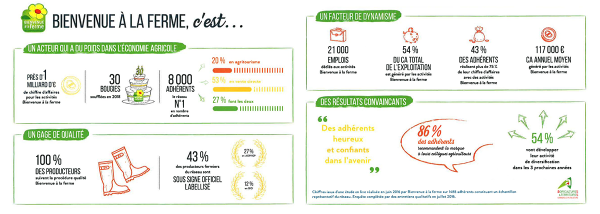
Village by CA startups are moving into short distribution channels
Strongly involved in regional economic development, the Village by CA network supports startups entering the short distribution channel market.
A few examples of startup support:
- A2PASd’ICI (Village by CA Nord de France): À2PASD'ICI is the number-one short distribution channel for catering and retail professionals.
- distri (Village by CA Lorraine): A benchmark app for local producers.
- PANIER LOCAL(Village by CA Atlantique Vendée): “Panier Local” (local basket) is an online management tool for short-distribution producers, helping them to succeed in their business, administrative and logistics challenges.
- TOUT PRÈS D’ICI (Village by CA Paris): “Tout Près d’Ici” supports the development, promotion and B2B sales of top-quality local food. The business model is based on two key components: a certification brand and a business intermediation platform.
- emerge (Village by CA Milan): “Emerge” is a food trading platform that brings producers into contact with buyers by means of a virtual market place. Producers can use the platform to present their products to their customers and sign business agreements. The platform’s theme-based presentation enables customers to choose the most attractive products. Emerge today comprises over 2,000 products and 300 producers.
Sources: Crédit Agricole S.A. – DCI/Agriculture Department; Group Economic Research Department; ECO, Xerfi and Les Echos studies.

